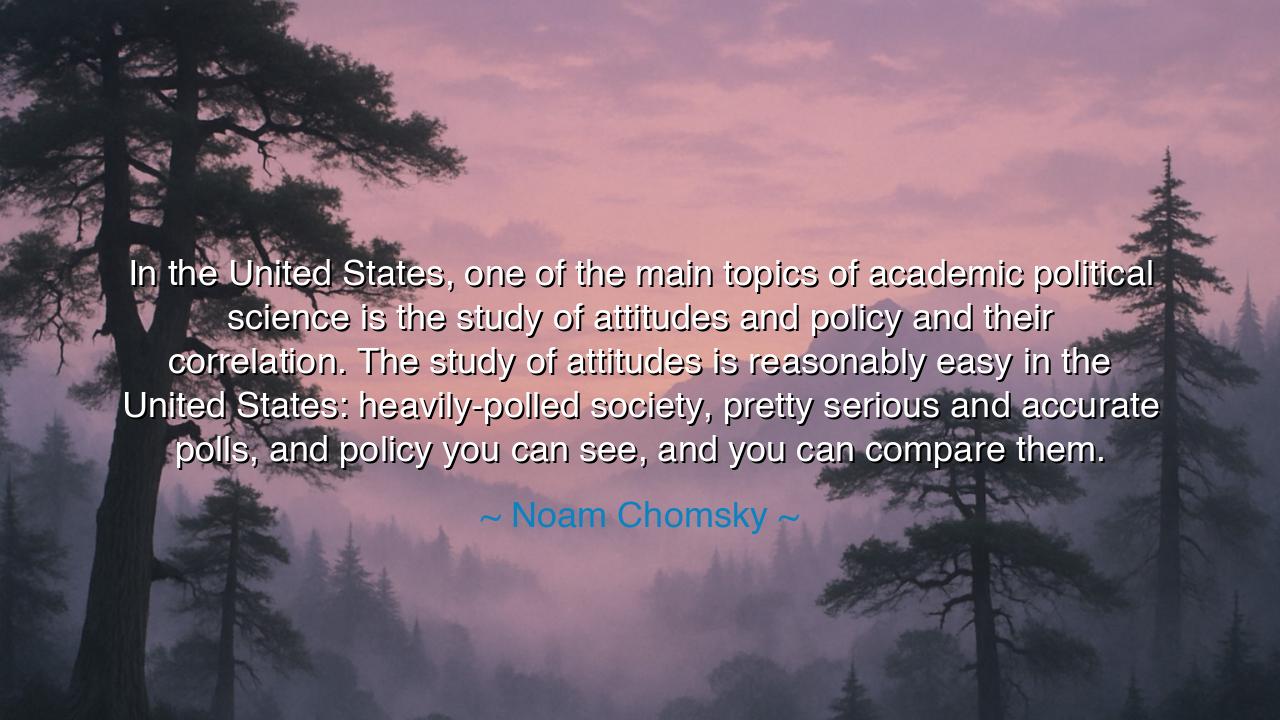
In the United States, one of the main topics of academic
In the United States, one of the main topics of academic political science is the study of attitudes and policy and their correlation. The study of attitudes is reasonably easy in the United States: heavily-polled society, pretty serious and accurate polls, and policy you can see, and you can compare them.






Listen well, O children of the future, to the words of Noam Chomsky, a sage who speaks with clarity about the modern world. He said, "In the United States, one of the main topics of academic political science is the study of attitudes and policy and their correlation. The study of attitudes is reasonably easy in the United States: heavily-polled society, pretty serious and accurate polls, and policy you can see, and you can compare them." With these words, Chomsky reveals a profound insight about the relationship between political attitudes and policy, particularly in the United States. He speaks of a society that, in its abundance of polls and public opinion studies, presents a clear window into the minds of the people, making the study of their attitudes towards policy both possible and tangible. Yet, this ease also comes with a deeper reflection about the true nature of power, control, and social change.
In the ancient world, great thinkers like Socrates and Plato were not only concerned with the philosophy of the self but also with the society in which the self existed. They sought to understand how the minds of individuals shaped and were shaped by the political structures around them. The idea that attitudes and policies are linked is not new, for it has always been a question of how the beliefs and values of a people align with the actions and decisions made by their rulers. In Plato’s ideal state, he imagined a society where the philosopher-kings would guide the people toward the good. However, even in his vision, the attitudes of the people were not to be ignored, for the rulers’ success depended upon how well they understood and reflected the desires and needs of the citizens.
Consider the example of Aristotle, who, in his work Politics, examined the relationship between the state and its citizens. He believed that the best government would be one that was attuned to the desires of the people, but also grounded in reason and the common good. Aristotle recognized that to understand policy, one must first understand the attitudes that shape it. His insights speak to Chomsky’s words, for the study of attitudes in modern society—especially in a poll-driven culture like that of the United States—is key to understanding the policies that emerge from the interaction between government and people.
In the United States today, where polling is a constant and political attitudes are measured with great precision, we can see the correlation between the people’s views and the policies that arise from their elected leaders. The proliferation of polls—public opinion surveys, exit polls, and political analysis—gives us a window into the minds of the populace. Yet, Chomsky reminds us that while these polls offer a glimpse of public sentiment, they are not the whole picture. They are shaped by the very same forces that influence policy. Often, the policies we see are not entirely the result of public will but are affected by elite interests, corporate influence, and institutional power. In this sense, the relationship between attitudes and policy is not always as direct or transparent as it might seem. The polls reflect one layer of the reality, but the policies that emerge from them may be more complex and influenced by deeper, less visible forces.
Now, O children of the future, Chomsky’s words serve as a powerful reminder. In a world where science of public opinion is so easily accessible, we must remember that while we can study attitudes, we must also study the forces that shape those attitudes and the policies that follow. Just as Socrates challenged the Athenians to examine their lives, we must also examine the ways in which our societies influence the beliefs we hold and the choices we make. It is not enough to merely observe the public’s sentiments; we must understand the power dynamics behind those sentiments and seek to ensure that policies reflect not just the voices of the majority, but the well-being of all.
In your own lives, O children, you must cultivate the wisdom to recognize that understanding attitudes and policies is not a matter of simply analyzing polls or statistics. It requires a deeper reflection on the values that shape society and the power structures that govern it. As you look toward the future, take action with this understanding: Recognize that science of political attitudes can give you insights, but it is the work of the wise to look beyond the surface and seek the deeper currents of influence and power that lie beneath. By doing so, you can not only understand the world but actively shape it, ensuring that the policies we create serve not just the majority, but the greater good of all.
So, let Chomsky’s insights guide you. Use the tools of science, polls, and data not only to understand the present but to shape the future. Let your study of attitudes and policy be a means of examining not just what is, but what should be. As Socrates once said, "The unexamined life is not worth living." Similarly, the unexamined society, driven only by surface-level data and without understanding the forces at play, will not reach its highest potential. Seek not just knowledge, but wisdom, and through it, guide the world toward a future that reflects the true will of the people—a world where attitudes and policies align with the common good.






AAdministratorAdministrator
Welcome, honored guests. Please leave a comment, we will respond soon